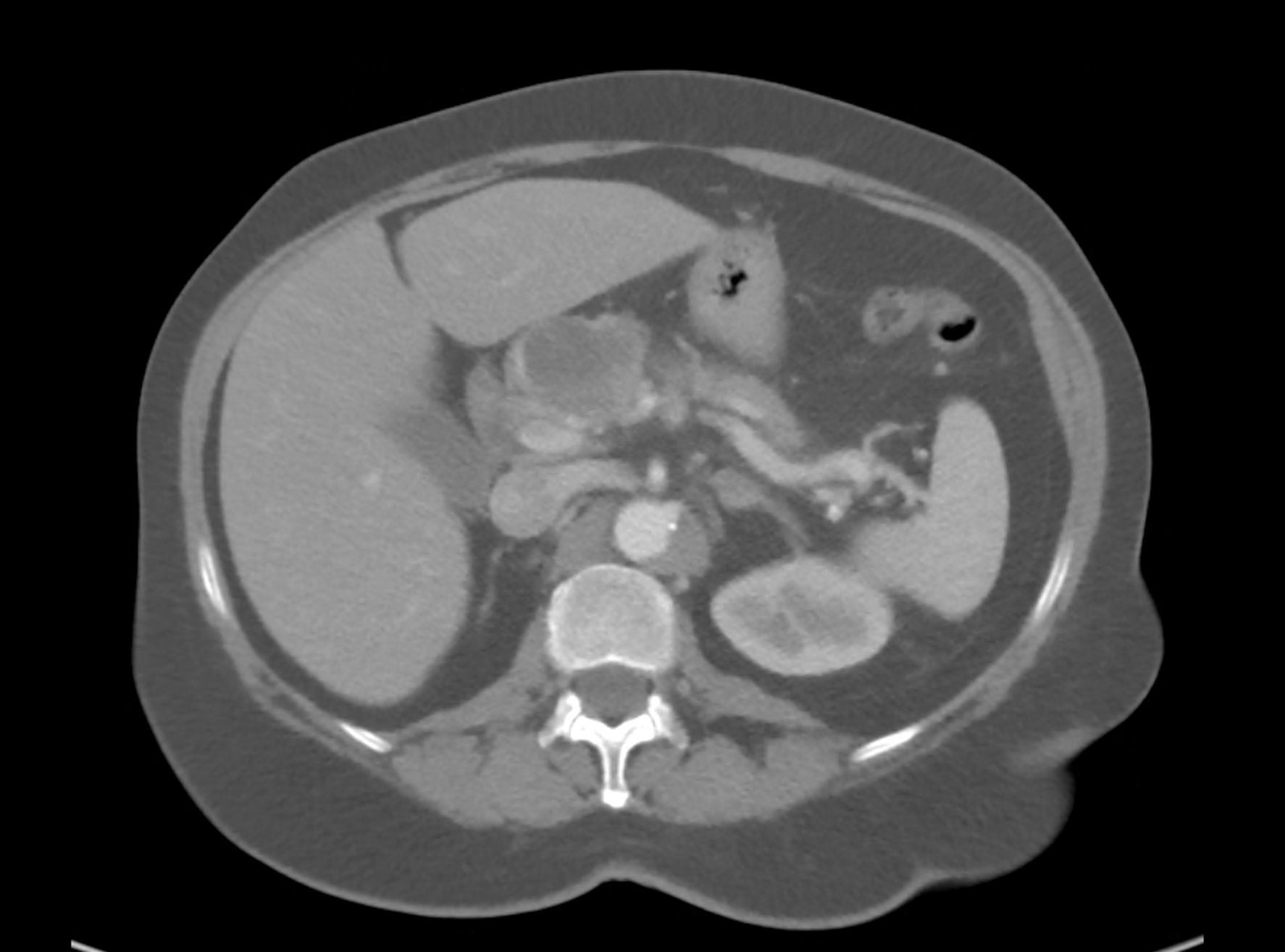Sunday Poster Session
Category: Biliary/Pancreas
P0238 - A Rare Face in a Familiar Place: Squamous Cell Carcinoma of the Pancreatic Head
Sunday, October 26, 2025
3:30 PM - 7:00 PM PDT
Location: Exhibit Hall
- QA
Qusai Almasad, MD
Roger Williams Medical Center
Providence, RI
Presenting Author(s)
Qusai AlMasad, MD, Paola Pena, MD, Aryanna Sousa, MD, MPH, Thaer Abdelfattah, MD, MPH
Roger Williams Medical Center, Providence, RI
Introduction: Squamous cell carcinoma (SCC) of the pancreas is exceptionally rare, with few cases reported in the literature. We describe a case of a 66-year-old female with a history of pulmonary SCC who presented with a pancreatic mass later confirmed as SCC. The case illustrates the diagnostic and therapeutic complexities associated with rare malignancies and atypical metastatic patterns.
Case Description/
Methods: The patient was initially diagnosed with a right lower lobe pulmonary mass, histologically confirmed as well-differentiated SCC. PET scan revealed a 4.5 cm intensely FDG-avid mass with central necrosis and subcarinal lymphadenopathy. She completed six cycles of chemotherapy carboplatin and paclitaxel and 30 sessions of radiation by 7/2024. Plans for immunotherapy were deferred due to clinical complications
2 months after her chemoradiation and during a subsequent hospitalization, a CT scan incidentally revealed a pancreatic head mass and regional lymphadenopathy. Notably, imaging from April 2024 had shown no pancreatic abnormalities. Given the rarity of pancreatic metastases from lung SCC, further evaluation was initiated. PET imaging and a gastroenterology consult were pursued. EUS identified a 30 × 24 mm mass in the pancreatic head. FNA confirmed poorly differentiated carcinoma with features consistent with SCC. While the findings are suggestive of metastasis from the known lung primary, primary pancreatic SCC-though exceedingly rare-could not be definitively ruled out. Eventually metastatic SCC was confirmed with immunohistochemistry
Discussion: This case underscores the complexity of diagnosing rare metastatic presentations. The pancreatic lesion emerged rapidly, with no prior imaging evidence just months earlier, suggesting an aggressive disease course. Histologic findings were consistent with SCC, matching the patient’s known pulmonary primary, though the rare possibility of a primary pancreatic SCC remains.
Pancreatic metastasis from lung SCC is extremely uncommon, complicating both diagnosis and treatment. The patient’s treatment was further challenged by prior complications that delayed immunotherapy. Standard treatment avenues have largely been exhausted, necessitating a multidisciplinary approach to manage both the primary lung cancer and the new pancreatic involvement
This report highlights a rare and aggressive presentation of lung SCC with suspected pancreatic metastasis. It emphasizes the need to maintain a high index of suspicion for atypical metastatic patterns in cancer patients

Figure: pancreatic head mass and regional lymphadenopathy

Figure: Endoscopic ultrasound identified a 30 × 24 mm mass in the pancreatic head
Disclosures:
Qusai AlMasad indicated no relevant financial relationships.
Paola Pena indicated no relevant financial relationships.
Aryanna Sousa indicated no relevant financial relationships.
Thaer Abdelfattah indicated no relevant financial relationships.
Qusai AlMasad, MD, Paola Pena, MD, Aryanna Sousa, MD, MPH, Thaer Abdelfattah, MD, MPH. P0238 - A Rare Face in a Familiar Place: Squamous Cell Carcinoma of the Pancreatic Head, ACG 2025 Annual Scientific Meeting Abstracts. Phoenix, AZ: American College of Gastroenterology.
Roger Williams Medical Center, Providence, RI
Introduction: Squamous cell carcinoma (SCC) of the pancreas is exceptionally rare, with few cases reported in the literature. We describe a case of a 66-year-old female with a history of pulmonary SCC who presented with a pancreatic mass later confirmed as SCC. The case illustrates the diagnostic and therapeutic complexities associated with rare malignancies and atypical metastatic patterns.
Case Description/
Methods: The patient was initially diagnosed with a right lower lobe pulmonary mass, histologically confirmed as well-differentiated SCC. PET scan revealed a 4.5 cm intensely FDG-avid mass with central necrosis and subcarinal lymphadenopathy. She completed six cycles of chemotherapy carboplatin and paclitaxel and 30 sessions of radiation by 7/2024. Plans for immunotherapy were deferred due to clinical complications
2 months after her chemoradiation and during a subsequent hospitalization, a CT scan incidentally revealed a pancreatic head mass and regional lymphadenopathy. Notably, imaging from April 2024 had shown no pancreatic abnormalities. Given the rarity of pancreatic metastases from lung SCC, further evaluation was initiated. PET imaging and a gastroenterology consult were pursued. EUS identified a 30 × 24 mm mass in the pancreatic head. FNA confirmed poorly differentiated carcinoma with features consistent with SCC. While the findings are suggestive of metastasis from the known lung primary, primary pancreatic SCC-though exceedingly rare-could not be definitively ruled out. Eventually metastatic SCC was confirmed with immunohistochemistry
Discussion: This case underscores the complexity of diagnosing rare metastatic presentations. The pancreatic lesion emerged rapidly, with no prior imaging evidence just months earlier, suggesting an aggressive disease course. Histologic findings were consistent with SCC, matching the patient’s known pulmonary primary, though the rare possibility of a primary pancreatic SCC remains.
Pancreatic metastasis from lung SCC is extremely uncommon, complicating both diagnosis and treatment. The patient’s treatment was further challenged by prior complications that delayed immunotherapy. Standard treatment avenues have largely been exhausted, necessitating a multidisciplinary approach to manage both the primary lung cancer and the new pancreatic involvement
This report highlights a rare and aggressive presentation of lung SCC with suspected pancreatic metastasis. It emphasizes the need to maintain a high index of suspicion for atypical metastatic patterns in cancer patients

Figure: pancreatic head mass and regional lymphadenopathy

Figure: Endoscopic ultrasound identified a 30 × 24 mm mass in the pancreatic head
Disclosures:
Qusai AlMasad indicated no relevant financial relationships.
Paola Pena indicated no relevant financial relationships.
Aryanna Sousa indicated no relevant financial relationships.
Thaer Abdelfattah indicated no relevant financial relationships.
Qusai AlMasad, MD, Paola Pena, MD, Aryanna Sousa, MD, MPH, Thaer Abdelfattah, MD, MPH. P0238 - A Rare Face in a Familiar Place: Squamous Cell Carcinoma of the Pancreatic Head, ACG 2025 Annual Scientific Meeting Abstracts. Phoenix, AZ: American College of Gastroenterology.
